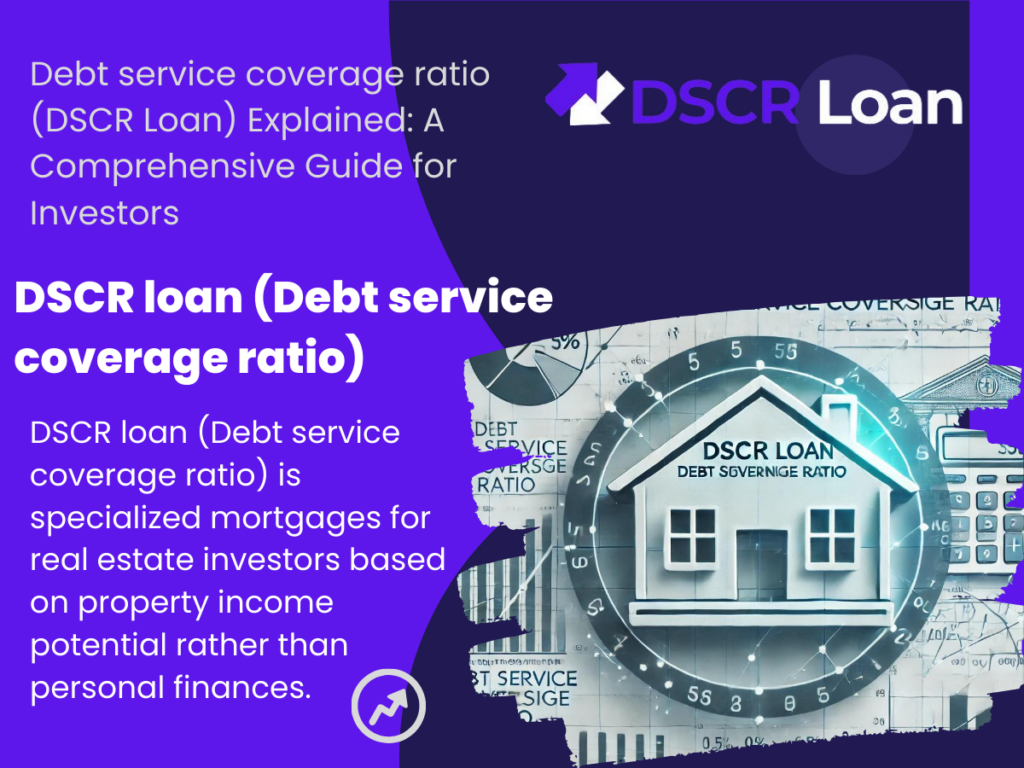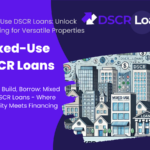DSCR loan (Debt service coverage ratio) is specialized mortgages for real estate investors based on property income potential rather than personal finances. They offer flexible qualification, larger loan amounts, and faster approvals. Minimum DSCR of 1.25 typically required. Suitable for residential and commercial investment properties.
DSCR Loans Explained: Your Ultimate Guide to Debt Service Coverage Ratio Financing
Are you a real estate investor looking for flexible financing options? If traditional mortgages have left you feeling stuck, it’s time to discover the power of DSCR loans. These innovative lending solutions are changing the game for property investors across the country. But what exactly is a DSCR loan, and how can it fuel your real estate ambitions? Let’s dive in and uncover everything you need to know about this exciting financing option.
What is a DSCR Loan? Breaking Down the Basics
Decoding DSCR: More Than Just an Acronym
DSCR stands for Debt Service Coverage Ratio. Don’t let the jargon intimidate you – we’ll break it down into bite-sized pieces that are easy to digest.
DSCR Loans: A Game-Changer for Real Estate Investors
A DSCR loan, also known as a debt service coverage ratio loan, is a specialized mortgage product designed with real estate investors in mind. Unlike conventional home loans that focus on your personal income, DSCR loans primarily consider the income potential of the investment property itself.
How DSCR Loans Differ from Traditional Mortgages
While traditional mortgages scrutinize your personal finances, employment history, and credit score, DSCR loans shift the spotlight to your property’s ability to generate income. This unique approach opens doors for investors who might not qualify for conventional financing.
The DSCR Calculation: Crunching the Numbers
Understanding the Debt Service Coverage Ratio
The debt service coverage ratio is a crucial financial metric that lenders use to evaluate a property’s capacity to cover its debt obligations. It’s calculated by dividing the property’s net operating income by its total debt service.
Mastering the DSCR Formula
Here’s a simple breakdown of how to calculate DSCR:
DSCR = Net Operating Income (NOI) / Total Debt Service
- Net Operating Income (NOI) is the annual income generated by the property after accounting for operating expenses but before debt payments.
- Total Debt Service includes the annual principal and interest payments on the loan.
What’s Considered a Good DSCR?
Most lenders look for a DSCR of 1.25 or higher. This means the property generates 25% more income than needed to cover its debt obligations. However, requirements can vary depending on the lender and specific loan program.
Why Real Estate Investors Love DSCR Loans
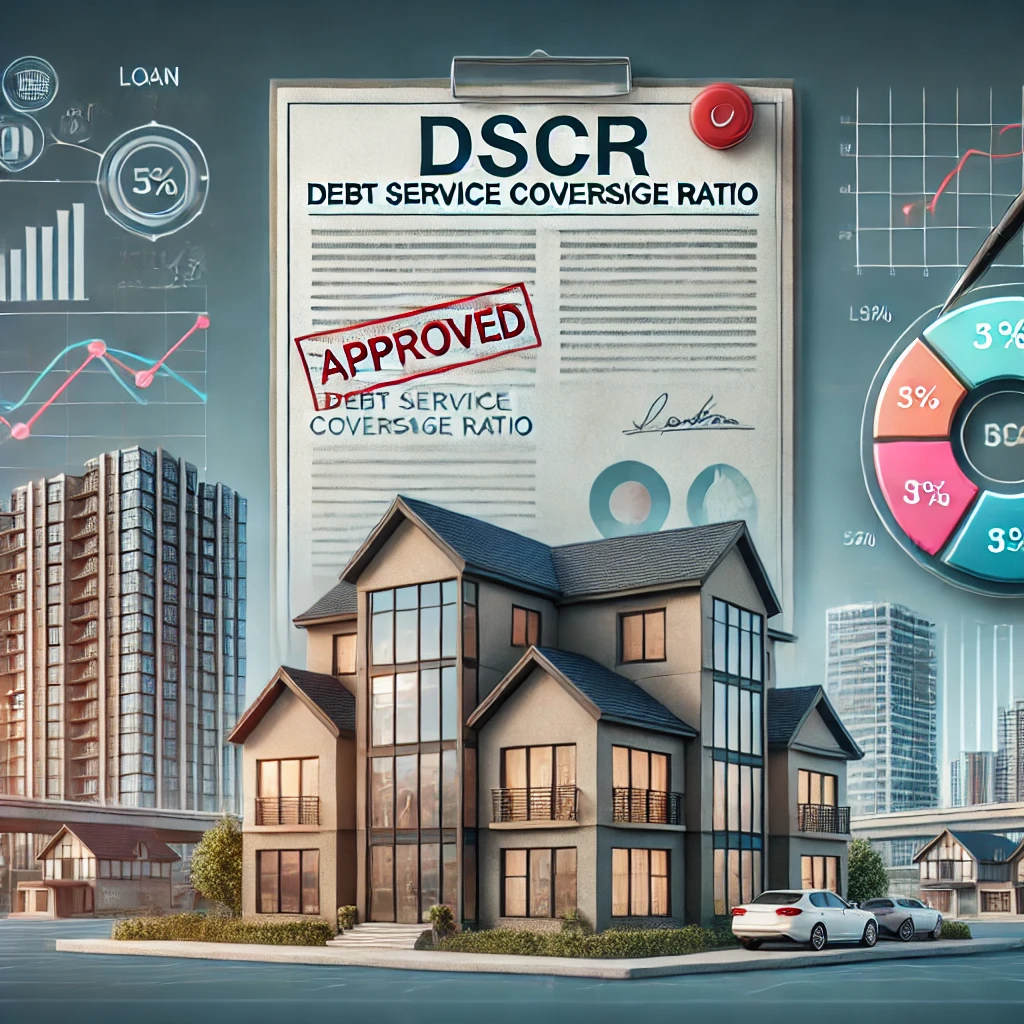
Streamlined Qualification Process
DSCR loans often have more flexible qualification requirements compared to traditional mortgages. This can be a game-changer for self-employed individuals or those with non-traditional income sources.
Unlock Larger Loan Amounts
Since DSCR loans are based on the property’s income rather than personal income, investors may qualify for larger loan amounts than they would with conventional financing.
Speed Up Your Investment Timeline
The streamlined focus on property income can lead to quicker approval processes and faster closing times, allowing investors to seize opportunities more rapidly.
Expand Your Real Estate Portfolio
DSCR loans can make it easier for investors to grow their real estate portfolios, even if they already have multiple mortgages on other properties.
DSCR Loan-Eligible Properties: What Qualifies?
Residential Investment Properties
DSCR loans are commonly used for:
- Single-family rental homes
- Multi-family properties (2-4 units)
- Condominiums and townhouses
Commercial Real Estate Opportunities
Some DSCR loan programs also cater to commercial properties such as:
- Office buildings
- Retail spaces
- Apartment complexes (5+ units)
Tapping into the Short-Term Rental Market
With the rise of platforms like Airbnb, some DSCR lenders now offer programs specifically tailored for short-term rental investments.
DSCR Loan Requirements: What You Need to Qualify
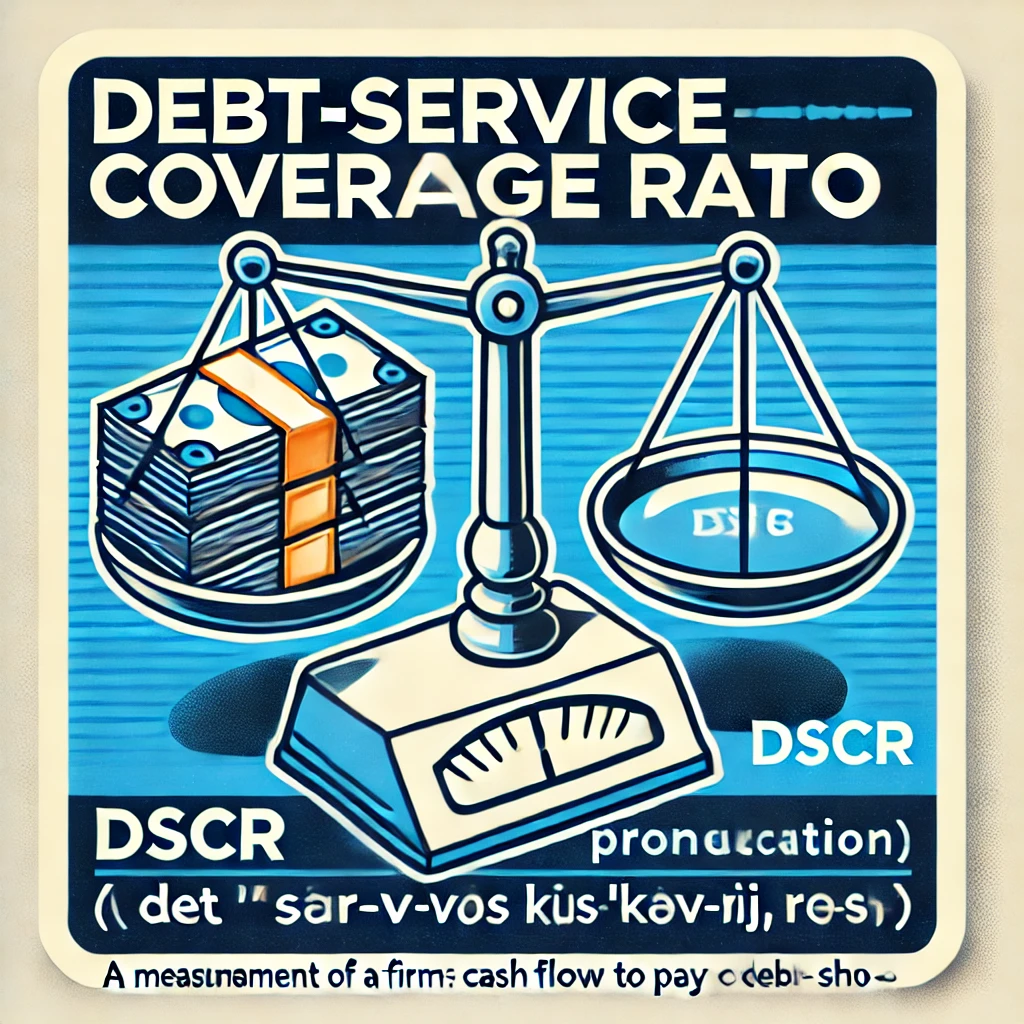
Meeting Minimum DSCR Thresholds
Most lenders require a minimum DSCR of 1.25, though this can vary. Some may accept lower ratios for strong borrowers or in competitive markets.
Navigating Down Payment Requirements
DSCR loans typically require a down payment of 20-25%, although some programs may offer options with as little as 10% down.
Credit Score Considerations for DSCR Loans
While DSCR loans are more flexible than conventional mortgages, most lenders still have minimum credit score requirements, often around 620-640.
Property Type and Condition Standards
Lenders will assess the property type and its condition to ensure it meets their standards for an investment property.
Applying for a DSCR Loan: Step-by-Step Guide
Gathering Essential Documentation
To apply for a DSCR loan, you’ll typically need to provide:
- Property details and purchase agreement (if applicable)
- Rent roll or lease agreements
- Property operating expenses
- Personal financial information
Where to Find DSCR Lenders
DSCR loans are offered by various institutions, including:
- Specialized mortgage lenders
- Some traditional banks
- Online lenders
Navigating the DSCR Loan Approval Process
The approval process generally involves:
- Initial application and document submission
- Property appraisal and income verification
- Underwriting and final approval
- Closing and funding
DSCR Loan Terms: What to Expect
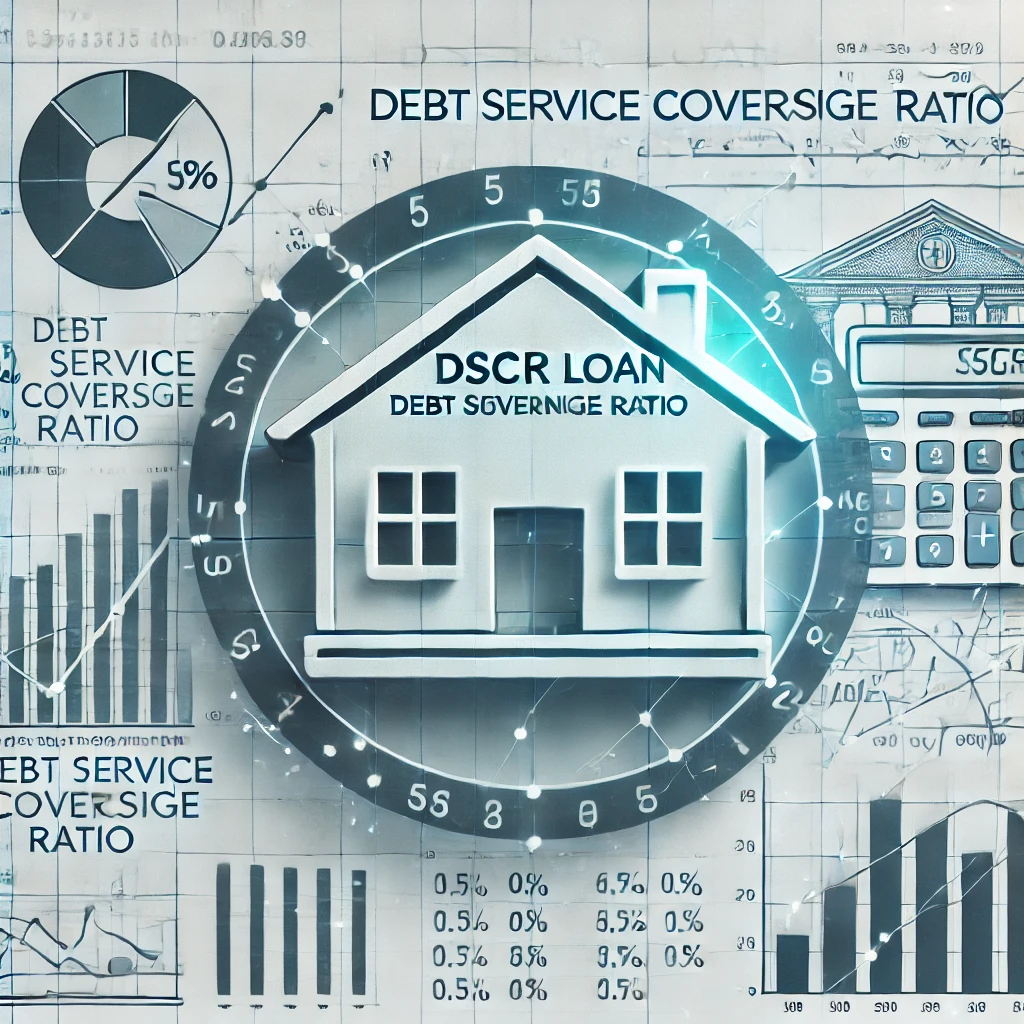
Understanding DSCR Loan Interest Rates
DSCR loan interest rates are typically higher than those for conventional mortgages, reflecting the increased risk to lenders.
Loan Terms and Amortization Options
Common DSCR loan terms include:
- 30-year fixed-rate options
- 5/1, 7/1, or 10/1 adjustable-rate mortgages (ARMs)
Beware of Prepayment Penalties
Some DSCR loans may include prepayment penalties, so it’s important to understand these terms before committing.
Weighing the Pros and Cons of DSCR Loans
Advantages of DSCR Financing
- Easier qualification for real estate investors
- Potential for larger loan amounts
- Faster approval process
- Ability to expand investment portfolios
Potential Drawbacks to Consider
- Higher interest rates compared to conventional mortgages
- Larger down payment requirements
- Potential prepayment penalties
- Not suitable for owner-occupied properties
DSCR Loans vs. Alternative Financing Options
DSCR Loans vs. Conventional Mortgages: Key Differences
DSCR loans focus on property income, while conventional mortgages emphasize personal income and credit history.
DSCR Loans vs. Hard Money Loans: Which is Right for You?
DSCR loans typically offer longer terms and lower interest rates compared to hard money loans, which are short-term, high-interest options.
DSCR Loans vs. FHA Loans: Comparing Investment Property Financing
Unlike FHA loans, DSCR loans are designed specifically for investment properties and don’t require mortgage insurance.
Strategies for DSCR Loan Success
Boosting Your Property’s Income Potential
To improve your DSCR, focus on strategies to increase your property’s income, such as:
- Implementing value-add improvements
- Optimizing rental rates
- Reducing vacancy periods
Trimming Operating Expenses
Lowering your property’s operating expenses can also boost your DSCR. Consider:
- Energy-efficient upgrades
- Preventive maintenance
- Bulk purchasing for multi-unit properties
Building Relationships with DSCR Lenders
Developing good relationships with DSCR lenders can lead to:
- Better loan terms
- Faster approvals for future investments
- Valuable market insights
Real-World DSCR Loan Success Stories
Case Study: Multi-Family Property Acquisition
Learn how one investor used a DSCR loan to acquire a 10-unit apartment complex, significantly expanding their portfolio.
Flipping Houses with DSCR Loans
Discover how a seasoned house flipper leverages DSCR loans to finance renovations and maximize profits.
From Single-Family to Commercial: A DSCR Loan Journey
Follow one investor’s path from residential to commercial real estate investing, all made possible through DSCR financing.
Overcoming DSCR Loan Challenges
Improving Your Debt Service Coverage Ratio
Strategies for boosting your DSCR to qualify for better loan terms.
Navigating Higher Interest Rates
Tips for managing the cost of DSCR loans and maximizing your return on investment.
Mitigating Risks in DSCR Loan Investments
Best practices for protecting your investment and ensuring long-term success with DSCR financing.
The Future of DSCR Loans in Real Estate Investing
Growing Popularity Among Savvy Investors
As more people turn to real estate investing, the demand for DSCR loans is likely to increase.
Potential Regulatory Changes on the Horizon
Keep an eye on potential regulatory changes that could impact DSCR loan availability and terms in the future.
Technological Advancements in DSCR Lending
Innovations in fintech may lead to more streamlined DSCR loan processes and potentially more competitive terms for borrowers.
Also Read: DSCR Loan Programs Decoded: Your 2024 Real Estate Investing Blueprint
Conclusion: Is a DSCR Loan Right for Your Investment Strategy?
DSCR loans offer a powerful financing tool for real estate investors, providing a unique approach that focuses on property performance rather than personal income. While they come with their own set of considerations, DSCR loans can unlock investment opportunities that might otherwise remain out of reach. As with any financial decision, it’s crucial to carefully weigh the pros and cons and consult with financial professionals before pursuing a DSCR loan.
FAQs: Your Top DSCR Loan Questions Answered
What credit score do I need for a DSCR loan?
While requirements vary by lender, most DSCR loans require a minimum credit score of 620-640.
Can I use a DSCR loan to finance my primary residence?
No, DSCR loans are specifically designed for investment properties and cannot be used for owner-occupied homes.
How quickly can I get approved for a DSCR loan?
The approval process for a DSCR loan can often be faster than traditional mortgages, typically taking 2-4 weeks from application to closing.
Are DSCR loans more expensive than conventional mortgages?
DSCR loans generally have higher interest rates than conventional mortgages due to the increased risk for lenders.
Is it possible to get a DSCR loan with no money down?
Most DSCR loans require a down payment of at least 20%, although some programs may offer lower down payment options for strong borrowers or in certain markets.

